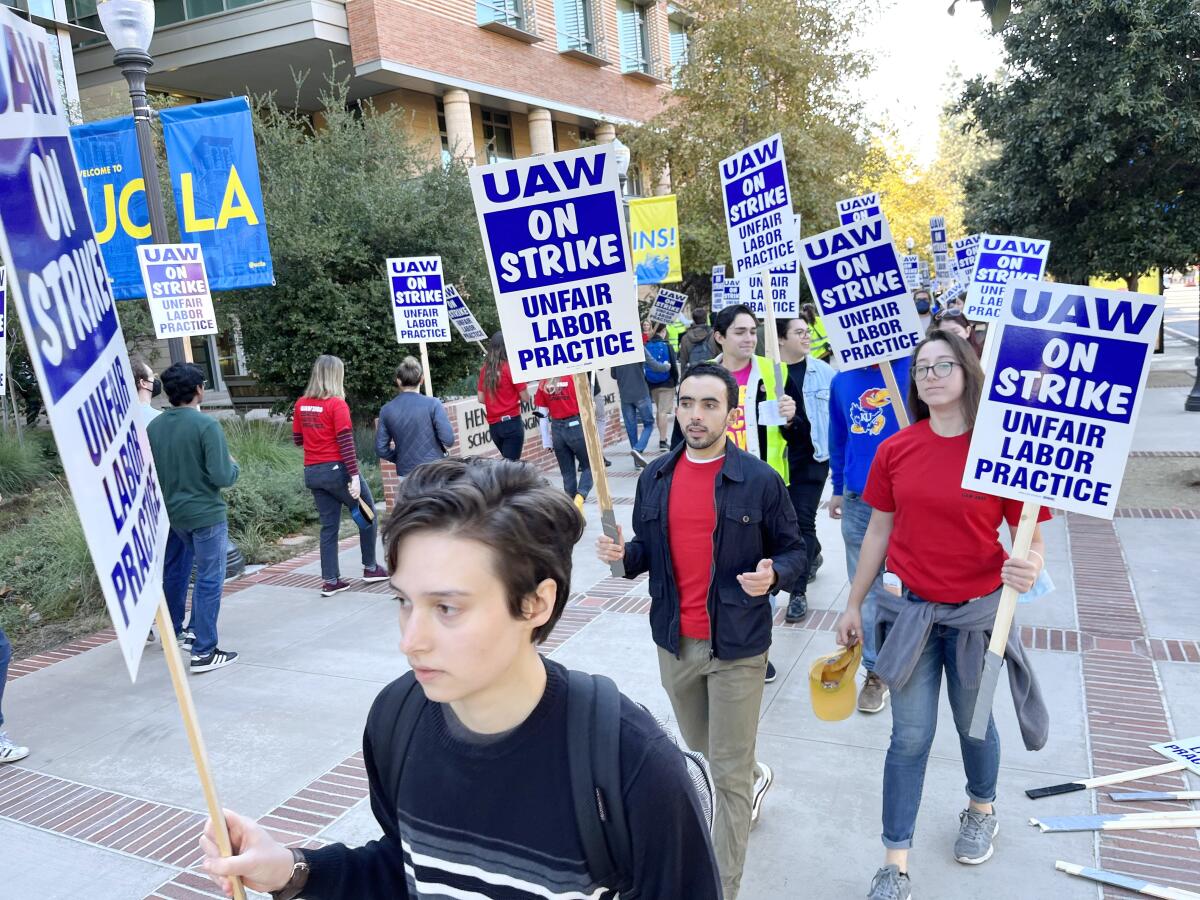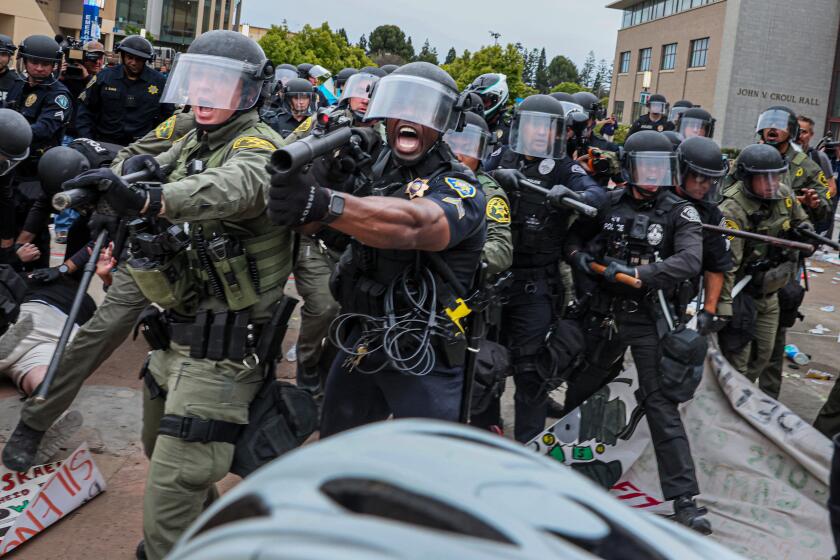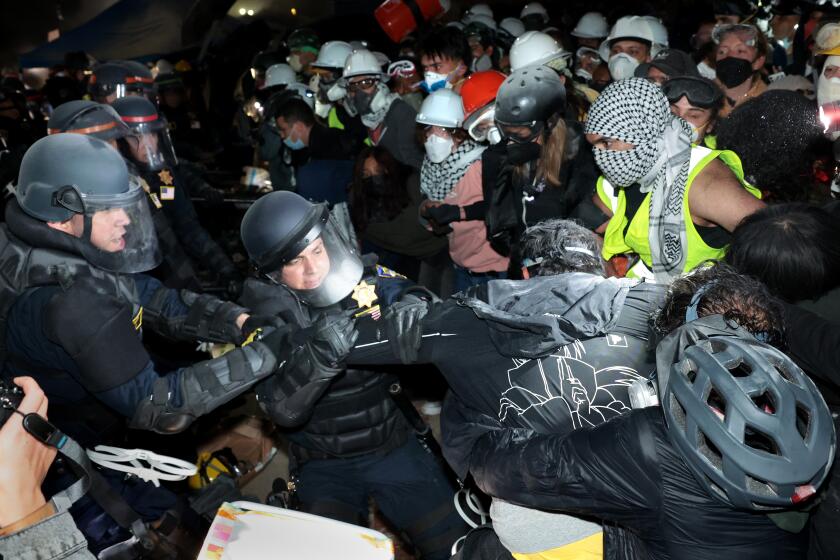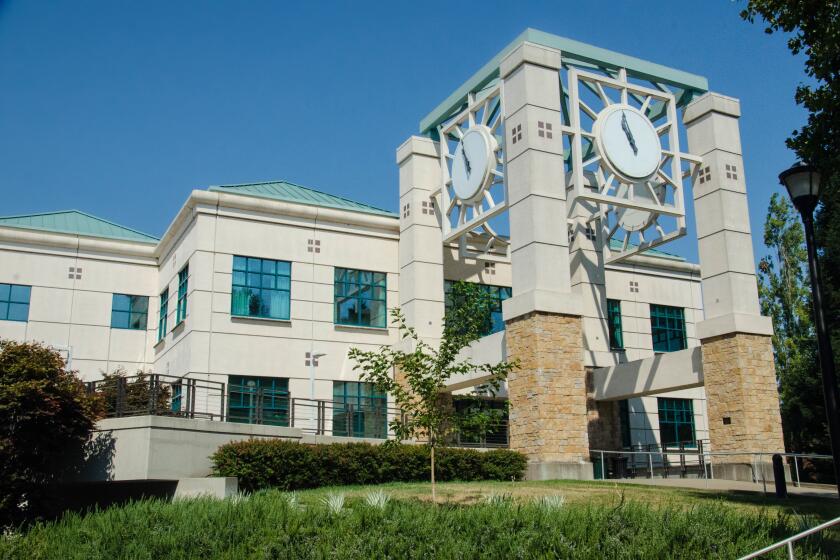‘Maximize chaos.’ UC academic workers authorize strike, alleging rights violated during protests

- Share via
The union representing 48,000 graduate student teaching assistants, researchers and other academic workers across the University of California’s 10 campuses has voted to authorize a strike, alleging that its workers’ rights have been violated at several universities by actions against pro-Palestinian protests, union leaders announced.
The potential walkouts, which are still being planned, were approved by 79% of the 19,780 members of the United Auto Workers Local 4811 who voted. The strike vote comes as campuses throughout the UC system have been roiled by tension and protests over the Israel-Hamas war, including a violent mob attack on a pro-Palestinian encampment at UCLA and the arrest of 47 protesters at UC Irvine on Wednesday.
Union leaders said they intend to provide more details Friday morning. The union has rebuked UCLA, UC San Diego and UC Irvine for what it says are unfair crackdowns on pro-Palestinian protesters, including union members. Any walkouts would come at a particularly critical time in the academic year as finals are approaching and grades will be due before commencements.
Hundreds of officers descended on the UC Irvine campus after protesters took over a lecture hall; 47 were arrested and the encampment cleared.
Rafael Jaime, the union’s co-president and a PhD candidate in UCLA’s English department, said the goal would be to “maximize chaos and confusion” at universities where the union alleges officials have violated workers’ rights over workplace conditions during student protests against the Israel-Hamas war.
“Our members have been beaten, concussed, pepper sprayed, both by counterprotesters and by police forces. As a union, it is our responsibility to stand beside them,” the union said in a statement. “In order to de-escalate the situation, UC must substantively engage with the concerns raised by the protesters — which focus on UC’s investments in companies and industries profiting off of the suffering in Gaza.”
The vote came after the union filed charges with the state labor board over the arrests of pro-Palestinian graduate student protesters at UCLA and suspensions and other discipline at UC San Diego and UC Irvine. The complaint accuses the universities of retaliating against student workers and unlawfully changing workplace policies to suppress pro-Palestinian speech.
Internal and external investigations are underway at UCLA.
In a letter sent to graduate student workers on Wednesday, the University of California warned students against striking, citing a no-strike clause in the union’s contract.
“The university’s position is that the union’s strike is unlawful . ... Participating in the strike does not change, excuse, or modify, an employee’s normal work duties or expectations. And, unlike a protected strike, you could be subject to corrective action for failing to perform your duties,” the unsigned letter from the UC office of the president said.
The letter defended calling police to campuses.
“We have a duty to ensure that all speech can be heard, that our entire community is safe, and that our property and common areas are accessible for all. These duties require the UC to take action when protests endanger the community and violate our shared norms regarding safe behavior and the use of public spaces. Importantly, UC’s actions have not been tied to negotiations with UAW or any employment issues whatsoever,” it said.
The academic workers’ strike would be modeled after last year’s “stand up” strikes against Ford, Stellantis and General Motors and similar to recent strikes at Southern California hotels. The walkouts would not target all campuses at once, Jaime said, but one by one based on how receptive administrations are to pro-Palestinian activists. He said strikes could run for any length of time through the end of June.
UC Riverside and UC Berkeley have reached agreements with protesters to end encampments and explore divestment from weapons companies. Leaders at those universities have rejected calls to target Israel specifically or for academic boycotts against exchange programs and partnerships with Israeli universities.
While some Jewish students have supported pro-Palestinian protests, national Jewish groups have criticized the divestment push, saying it is antisemitic because it aims to delegitimize the only predominantly Jewish nation.
In November and December 2022, the union walked out for six weeks, winning significant improvements in wages and working conditions and energizing a surge of union activism among academic workers across the nation.
Before the strike vote results came out, the University of California said the union was inappropriately flexing its muscle on a political issue. Heather Hansen, a spokeswoman for the UC office of the president, said the union was setting a “dangerous precedent that would introduce non-labor issues into labor agreements.”
In the wake of a mob attack on a pro-Palestinian encampment, UCLA chancellor is facing faculty criticism, including a no-confidence vote to take place Thursday.
The disagreement hinges on whether student workers such as Jaime, who was part of pro-Palestinian protests at UCLA the night a violent mob attacked the encampment, are striking over a “workplace issue or political speech,” said John Logan, a professor in the department of labor and employment studies at San Francisco State University.
“The contract between UAW and UC does include language on academic freedom, but the university could say, ‘Yes, speech is protected, but the actions you engaged in go far beyond speech, preventing students from getting into [a] library or other campus [areas] that are not protected,’” Logan said.
In a letter released after the vote, the vice chair of the University of California Academic Senate said that faculty could opt to join the strikes in support of academic workers but would risk losing pay. The letter from UC Academic Chair James A. Steintrager said faculty “cannot be required to take on additional responsibilities for teaching related to a work stoppage”
Pro-Palestinian protesters at UC Berkeley removed their encampment after talks with the university, which said it will consider their divestment demands.
Professors have “have the right to strike and to respect the picket line by, for example, not entering classroom buildings that are picketed,” said Steintrager, a UC Irvine professor of English, Comparative Literature and European Languages. “However, if the strike is determined to be unlawful, any sympathy strike would be unlawful as well.”
The union did not give a campus-by-campus breakdown of support for the vote but said it would consider levels of support in choosing which campuses to call up to strike. About 41% of the total membership voted.
As college presidents across the country have faced criticism for calling in police in riot gear to clear pro-Palestinian encampments, the move to threaten a strike is one of the biggest actions by an American labor union in support of Palestinians.
Some members said they believed the union’s criticism of the campus protest crackdown did not go far enough. Many student protesters have called for campus police to be defunded or for universities to vow to never again call municipal police to campus. The union did not include those issues in its strike-related demands.
“It’s really disappointing to me as a Black person that the union did not take a strong stance on policing and racial profiling on campus,” said Gene McAdoo, a doctoral student in the UCLA School of Education and Information Studies. “They portray themselves as radical, yet aren’t on this issue.”
A day after releasing a campus message saying Sonoma State University would pursue ‘divestment strategies’ and an academic boycott of Israel, President Mike Lee was placed on leave for ‘insubordination’
McAdoo still voted in support, he said, because “withholding our labor gives us a lot of power and leverage to push the UC administration to meet demands for divestment. That is the ultimate goal of this movement. But I also know that there is an undercurrent of folks who are still pushing for cops off campus.”
It’s not the first time UAW workers have pushed for divestment. In 1973, Arab American workers in Detroit auto plants walked off the job in protest of the union’s investment in Israeli bonds.
But for a union to vote on a strike while a contract is in place is “unheard of in modern times,” said Jeff Schuhrke, a labor historian who teaches at SUNY Empire State University.
While the union demands on academic freedom, free speech and protection from violence could arguably center on workplace conditions, they also explicitly support protesters’ calls for divestment.
The strike vote “is not about economics. It’s not about a raise, or more benefits. It’s political,” Schuhrke said.
The professor said that harked back to the origins of the student labor movement, when the first graduate unions formed in the 1960s during the campus free speech and antiwar movements.
AFT Local 1570, a union of teaching assistants formed at UC Berkeley in the throes of the campus free speech movement, voted in 1966 to strike against the University of California in response to police arresting students conducting a sit-in around a U.S. Navy recruitment table on campus.
The Teaching Assistants’ Assn. at University of Wisconsin-Madison, which grew out of the anti-draft sit-in and campus demonstrations against Dow Chemical for its role in production of napalm and other weapons for the Vietnam War, is the oldest graduate union still in existence in the U.S.
“The graduate union movement is coming full circle,” Schuhrke said.
More to Read
Sign up for Essential California
The most important California stories and recommendations in your inbox every morning.
You may occasionally receive promotional content from the Los Angeles Times.
















